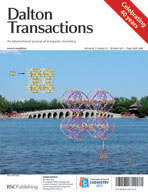Four new nickel(II) complexes, [Ni2L2(NO2)2]·CH2Cl2·C2H5OH, 2H2O (1), [Ni2L2(DMF)2(μ-NO2)]ClO4·DMF (2a), [Ni2L2(DMF)2(μ-NO2)]ClO4 (2b) and [Ni3L′2(μ3-NO2)2(CH2Cl2)]n·1.5H2O (3) where HL = 2-[(3-amino-propylimino)-methyl]-phenol, H2L′ = 2-({3-[(2-hydroxy-benzylidene)-amino]-propylimino}-methyl)-phenol and DMF = N,N-dimethylformamide, have been synthesized starting with the precursor complex [NiL2]·2H2O, nickel(II) perchlorate and sodium nitrite and characterized structurally and magnetically. The structural analyses reveal that in all the complexes, NiII ions possess a distorted octahedral geometry. Complex 1 is a dinuclear di-μ2-phenoxo bridged species in which nitrite ion acts as chelating co-ligand. Complexes 2a and 2b also consist of dinuclear entities, but in these two compounds a cis-(μ-nitrito-1κO:2κN) bridge is present in addition to the di-μ2-phenoxo bridge. The molecular structures of 2a and 2b are equivalent; they differ only in that 2a contains an additional solvated DMF molecule. Complex 3 is formed by ligand rearrangement and is a one-dimensional polymer in which double phenoxo as well as μ-nitrito-1κO:2κN bridged trinuclear units are linked through a very rare μ3-nitrito-1κO:2κN:3κO′ bridge. Analysis of variable-temperature magnetic susceptibility data indicates that there is a global weak antiferromagnetic interaction between the nickel(II) ions in four complexes, with exchange parameters J of −5.26, −11.45, −10.66 and −5.99 cm−1 for 1, 2a, 2b and 3, respectively.


 Please wait while we load your content...
Please wait while we load your content...